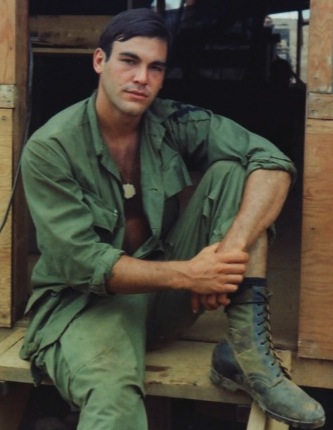Thursday, January 15, 1987
PLATOON. Music by Georges Delerue. Written and directed by Oliver Stone. Running time: 118 minutes. Restricted entertainment with the B.C. Classifier's warning: frequent violence, very coarse language.
CHRIS TAYLOR (CHARLIE SHEEN) is trying to do the right thing. A college drop-out, he joined the army in search of personal validation, undertaking an idealistic, almost romantic search for self in the crucible of conflict.
Newly arrived in Vietnam, he wants to "live up to what grandpa did in the first war, and dad did in the second." Boy, has he picked the wrong war.
Oliver Stone is doing a necessary thing. "Vietnam messed a lot of guys up,'' he's said, explaining the forces that impelled him to make a deeply personal film like Platoon. "It put us out of step with our own generation.''
Stone, a Vietnam combat veteran who has since become an Oscar-winning screenwriter (for 1978's Midnight Express) and a feature filmmaker (he wrote and directed last year's Salvador), wants to exorcise some of the horror that he experienced in the Southeast Asian jungle. As stark and powerful as 1979's Apocalypse Now, his Platoon has the searing impact of an incoming round.
The time is 1967. Private Taylor arrives for his tour of duty expecting something akin to 1945's A Walk in the Sun (Robert Rossen's classic examination of Second World War combat on the squad level), only to discover that purpose and camaraderie are conspicuously absent in this war without fronts, obvious military objectives or a readily identifiable enemy.
At first, the impressionable Taylor is drawn to his platoon's battle-scarred staff sergeant, Bob Barnes (Tom Berenger), a man who appears to be something of a super soldier. As he gains experience, though, he realizes that the unconventional Sgt. Elias (Willem Dafoe) is every bit as effective, but without the sacrifice of his humanity.
Though both sergeants are seasoned vets, Elias has not forgotten his morals, nor the hearts and minds that they've been sent to the 'Nam to win. Less subtle, Barnes has reduced the war to a raw game of survival. "There's the way it ought to be, and there's the way it is.''
Inevitably, Barnes and Elias come into conflict, with the enlisted men — the "grunts'' — choosing up sides. It is in this "civil war in the platoon'' that Stone (through his fictional alter ego Taylor) finds his ultimate metaphor for the U.S. failure.
There is a temptation to view Stone's drama as an unofficial prequel to Francis Ford Coppola's Apocalypse Now. Charlie Sheen, the actor playing Taylor, certainly resembles his father, Martin Sheen, the star of the earlier film.
Worth remembering, though, is the fact that Coppola (who was born in 1939) based his picture on an idea by film school graduate George (Star Wars) Lucas, and his gun-buff buddy John (Red Dawn) Milius. Deliberate artifice, it was a conscious reworking of Joseph Conrad's 19th-century tale, Heart of Darkness.
Stone, born in 1946, served in Vietman, collecting two real wounds, a Bronze Star and the Purple Heart. Though his screenplay has been fictionalized and shaped to maximize the dramatic effect, his Platoon remains the most devastatingly authentic cinematic recollection of the war yet.
The above is a restored version of a Province review by Michael Walsh originally published in 1987. For additional information on this archived material, please visit my FAQ.
Afterword: Oliver Stone's social conscience was not immediately evident. Following his service in Vietnam, he entered New York University's film studies program, graduating in 1971. He made his first feature film in Canada, going on location in Quebec to direct Hamilton-born Jonathan Frid in Seizure (1974), the story of a horror writer whose villainous creations come to life. He made his professional breakthrough four years later, when his screenplay for Alan Parker's "based-on-a-true-story" thriller Midnight Express (1978) earned him his first Oscar win. His second try at directing, 1981's The Hand, was marginally more successful than Seizure, and he returned to screenwriting for others until 1986. The one-two punch of Salvador and Platoon (winner of the year's best picture Academy Award, and Stone's first Oscar win as best director), elevated him to the A-list. In short order, he completed his Vietnam trilogy (with 1989's Born on the Fourth of July and 1993's Heaven and Earth), took on American pop culture — rock 'n' roll in 1991's The Doors; celebrity outlaws in 1994's Natural Born Killers; pro sports in 1999's Any Given Sunday — and offered his counter-myths on Presidents Kennedy, Nixon and G.W. Bush. And now, with 19 fictional features on his resume, Stone is producing documentaries with all of his Boom Generation dedication to making art that makes a difference.
